|
|
|
Sort Order |
|
|
|
Items / Page
|
|
|
|
|
|
|
| Srl | Item |
| 1 |
ID:
164285
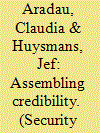

|
|
|
|
|
| Summary/Abstract |
Critical approaches in security studies have been increasingly turning to methods and standards internal to knowledge practice to validate their knowledge claims. This quest for scientific standards now also operates against the background of debates on ‘post-truth’, which raise pressing and perplexing questions for critical lines of thought. We propose a different approach by conceptualizing validity as practices of assembling credibility in which the transversal formation and circulation of credits and credentials combine with disputes over credence and credulity. This conceptualization of the validity of (critical) security knowledge shifts the focus from epistemic and methodological standards to transepistemic practices and relations. It allows us to mediate validity critically as a sociopolitical rather than strictly scientific accomplishment. Developing such an understanding of validity makes it possible for critical security studies and international relations to displace epistemic disputes about ‘post-truth’ with transversal practices of knowledge creation, circulation and accreditation.
|
|
|
|
|
|
|
|
|
|
|
|
|
|
|
|
| 2 |
ID:
161492
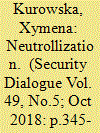

|
|
|
|
|
| Summary/Abstract |
This article considers the significance of trolling for security processes through a contextual analysis of industrialized pro-Kremlin trolling in the Russian blogosphere. The publicity surrounding Russia’s hacking activities in international politics conceals the significance of the domestic trolling culture in Russia and its role in the ‘trolling turn’ in Russia’s foreign policy. We contextually identify the practice of ‘neutrollization’ – a type of localized desecuritization where the regime adopts trolling to prevent being cast as a societal security threat by civil society. Neutrollization relies on counterfeit internet activism, ostensibly originating from the citizenry, that produces political disengagement by breeding radical doubt in a manner that is non-securitizing. Rather than advocating a distinct political agenda, and in contrast to conventional understandings of the operations of propaganda, neutrollization precludes the very possibility of meaning, obviating the need to block the internet in an openly authoritarian manner. It operates by preventing perlocution – that is, the social consequences of the security speech act. This prevention is achieved through the breaking or disrupting of the context in which acts of securitization could possibly materialize, and is made possible by a condition of ‘politics without telos’ that is different from the varieties of depoliticization more familiar in Western societies.
|
|
|
|
|
|
|
|
|
|
|
|
|
|
|
|
| 3 |
ID:
174717


|
|
|
|
|
| Summary/Abstract |
Approximately 8,000 boys and men were killed in the 1995 Srebrenica genocide. The victims were disappeared, killed and buried in secret mass graves. In this article, I examine how forensic anthropologists, demographers and forensic geneticists produced technolegal knowledge about the number of victims in the wake of the genocide; how those numbers were validated in legal proceedings against those held responsible; and, finally, how some have tried to destabilize the numbers in attempts to deny that a genocide was committed. While numbers, and the larger category of knowledge, take centre stage in the discussion, I use Srebrenica’s aftermath to introduce the concept of ontologically dirty knots, which is an analytical and methodological innovation that enables us to produce scholarly accounts of events, such as the Srebrenica genocide, that are characterized partly by secrecy, partly by controversy and partly by materiality. It ties together meaning and materiality, signals a process that continues to evolve, and suggests that narratives about what happened are the results of entanglements, action and friction that can be undone. In these respects, the article addresses current discussions on actor-network theory within critical security studies.
|
|
|
|
|
|
|
|
|
|
|
|
|
|
|
|
| 4 |
ID:
158177
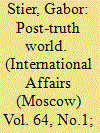

|
|
|
|
|
| Summary/Abstract |
FAKE NEWS played a very limited role in the presidential campaign in the United States that brought Donald Trump to the White House yet the despair of the Western liberal world attracted a lot of attention to this phenomenon.
|
|
|
|
|
|
|
|
|
|
|
|
|
|
|
|
| 5 |
ID:
175956
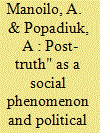

|
|
|
|
|
| Summary/Abstract |
IN RECENT YEARS, an interest in the post-truth phenomenon has spread far and wide into political and other social sciences. On the whole, it is related to the process of psychological impact on human consciousness and subconsciousness, in the course of which people might radically change their opinion about any important social or political event that has already taken place. This happens under an impact of reinterpretation of previously disregarded events or their details. The public is offered interpretations that occupy information space and penetrate public consciousness; they are accompanied by fakes disguised as verified news, or inventions and rumors presented as versions, opinions of respected "experts," "fashionable" bloggers and journalists entrusted with the task of planting "post-truths" in the collective mind of target audiences and individual minds of each of its members. The collective opinion changed by "post-truth" might change individual positions of citizens.
|
|
|
|
|
|
|
|
|
|
|
|
|
|
|
|
| 6 |
ID:
189877
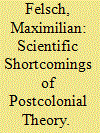

|
|
|
|
|
| Summary/Abstract |
In the social sciences, there is a trend towards normative, identity based and activist understanding of science. This trend is particularly evident in the rise of postcolonial theory. This paper critically engages with its impact in International Relations. Postcolonial theory aims to challenge established methodologies and arguments in all social science disciplines but shows little interest in rigorous research and the production of scientific knowledge. This paper highlights the most fundamental flaws of postcolonial theory, such as ideological bias, the application of blurred and one-sided concepts, the preference for anecdotal evidence over empirical evidence and ignorance of the major social and political trends of our time. Subsequently, it is argued that postcolonial theory contributes to a distorted perception of reality. Perhaps, this article can stimulate a debate about the function and scientific nature of social sciences at a time when feelings and emotions, not facts, increasingly dominate academia.
|
|
|
|
|
|
|
|
|
|
|
|
|
|
|
|
| 7 |
ID:
191487
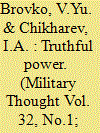

|
|
|
|
|
| Summary/Abstract |
This article considers the tendency to distort truth in modern political and military processes as a consequence of the degradation of the international political and military strategies of the US and its allies in a unipolar world and - in a broader context - the systemic crisis of Western civilization. It also substantiates the need to develop and implement the innovative concept of "truthful power" to effectively counteract the detrimental consequences of the promotion of post-truth and falsification in international relations.
|
|
|
|
|
|
|
|
|
|
|
|
|
|
|
|
|
|
|
|
|